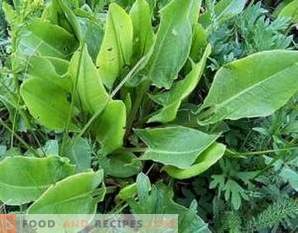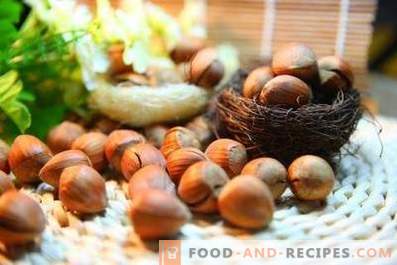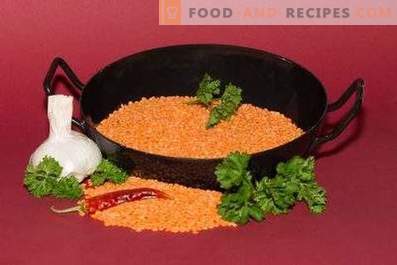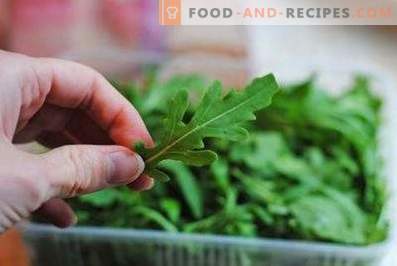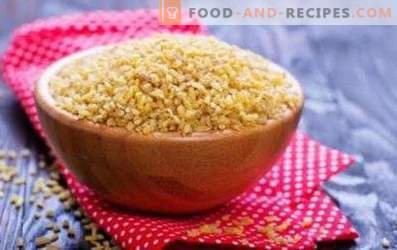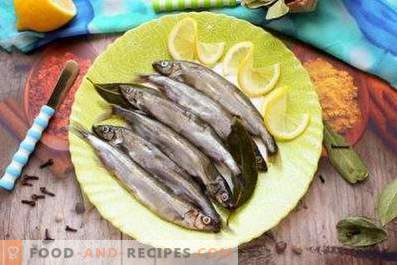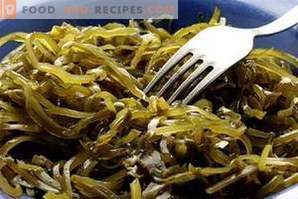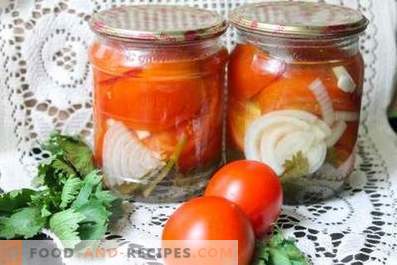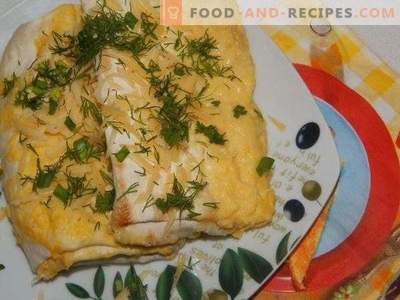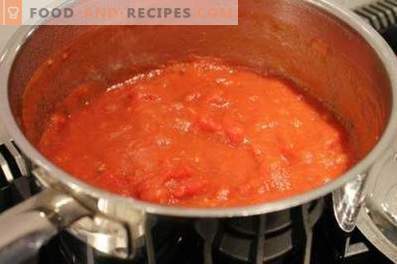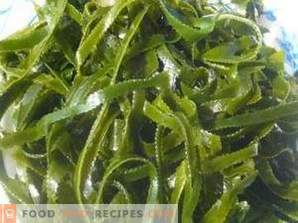
Sea kale is a food product that is obtained from seaweed of the Laminaria family - palchatorassserennoy and sugary kelp. The natural habitat of these species is underwater cliffs and stony ground of the Sea of Okhotsk, White, Black, Kara or the Sea of Japan. Plants form real thickets at a depth of 5-10 meters in places with a constant flow.
Green mesh, wrinkled or smooth thawed seaweed has a ribbon-like shape. Algal plates reach 15 cm in width and 13 meters in length. In the lower part of the plant, the thallus is transformed into a cylindrical trunk with a diameter of up to 4 cm and a length of up to 90 cm. The plant is fixed in underwater soil with the help of numerous filamentous processes, the rhizoids.
In many coastal countries, sea kale is considered a key food item. Palmar and sugary kelp is eaten raw, boiled, canned and pickled, used to make mashed potatoes, casseroles, salads, burgers and soups. In addition, algae are actively used in traditional medicine for the treatment of diseases of the digestive tract, thyroid gland, hematopoietic system and other pathologies.
Nutritional value of seaweed and vitamins in its composition
Nutritional value of 100 g of sea kale:
- 0, 877 g of proteins;
- 0, 194 g of fat;
- 2, 981 g of carbohydrates;
- 0, 544 g of fiber;
- 87, 912 g of water;
- 2, 457 g of organic acids;
- 4, 081 g of ash.
Vitamins in 100 g of palmarine or sugary kelp:
- beta-carotene - 0, 146 mg;
- choline, B4 - 12, 794 mg;
- niacin equivalent, PP - 0, 391 mg;
- thiamine, B1 - 0, 037 mg;
- retinol equivalent, A - 2, 466 μg;
- ergocalciferol, D - 0, 003 mg;
- folic acid, B9 - 2, 277 mg;
- tocopherol equivalent, E - 0, 864 mg;
- riboflavin, B2 - 0, 058 mg;
- ascorbic acid, C - 1, 978 mg;
- phylloquinone, K - 0, 008 mg;
- pyridoxine, B6 - 0, 017 mg.
Calories of seaweed
100 g of raw or boiled seaweed contains 24, 877 kcal. The energy value of the same portion of dried palmatologic or sugary laminaria - 477, 102 kcal. In 100 g of pickled seaweed - 62, 011 kcal, and in the same amount of seaweed prepared in Korean - 79, 808 kcal.
Useful elements in seaweed
Macronutrients in a 100-gram serving of sea kale:
- potassium - 968, 609 mg;
- sulfur - 8, 035 mg;
- calcium - 39, 067 mg;
- phosphorus - 54, 331 mg;
- magnesium - 169, 872 mg;
- sodium - 519, 133 mg.
Trace elements in 100 g of seaweed:
- iodine - 299, 014 mkg;
- iron - 15, 772 mg.
The benefits of sea kale
- Sea kale is a low-calorie product that activates metabolic processes in the body. In order to speed up the metabolism and get rid of excess weight, it is enough to include about 50 g of these edible algae into your diet daily.
- Laminaria is a natural source of iodine, which is necessary for the proper and proper functioning of the thyroid gland. People who regularly eat food on its basis are less likely to experience manifestations of hypothyroidism, myxedema, endemic goiter and cretinism.
- Edible laminaria contains a whole complex of vitamins, beneficial elements and other nutrients. Every day, including in the diet this product, you can reliably protect against hypovitaminosis and beriberi.
- Laminaria is rich in dietary fiber and other compounds that stimulate the functioning of the intestinal muscles, promote the production of gastric juice and improve the functioning of the digestive system as a whole.
- Laminaria - a product with laxative properties. Even a small portion of these algae helps to get rid of prolonged constipation.
- Nutrients are contained in seaweed, due to which radioactive substances, toxins, salts of heavy metals and other compounds hazardous to health are removed from the body at an accelerated rate.
- Substances that enter the gastrointestinal tract with regular use of edible laminaria, prevent the accumulation of harmful cholesterol in the body. Due to this, the risk of atherosclerosis is significantly reduced.
- Potassium, magnesium, iron and other nutrients with which sea kale is rich, help to normalize the level of hemoglobin in the blood, strengthen the heart muscle, reduce blood pressure to normal levels. With regular consumption of this product, the likelihood of developing heart ischemia, heart attack, arrhythmias and other diseases of the cardiovascular system is reduced.
- Laminaria is rich in compounds that normalize blood clotting, preventing the development of severe bleeding and the formation of blood clots.
- Laminaria contains a complex of beneficial compounds that strengthen the immune system and enhance the overall resistance of the body. This product significantly reduces the risk of contracting infectious diseases during epidemics.
- The antioxidant substances with which this product is rich interfere with the formation of tumor neoplasms in the body, thereby reducing the risk of developing cancer. In addition, they slow down the aging of the tissues of the human body, prolong life, help to preserve youth and beauty for many years.
- Regularly including sea kale in the diet, it is possible to ensure sufficient intake of B vitamins. These useful compounds not only accelerate the metabolism, but also have a healing effect on the nervous system, reduce the risk of developing depression and neurosis, help to withstand psycho-emotional upheavals and stress, improve mood and sleep.
- The substances present in the kelp help to increase the efficiency, physical endurance and general body tone, and cope with the constant feeling of fatigue.
- Daily consumption of sea kale allows you to maintain a normal musculoskeletal system. The nutrients contained in this product improve the structure of bone tissue, strengthen teeth, prevent the development of osteoporosis, arthritis, arthrosis, rheumatism and other diseases of the spine and joints.
- Sodium and potassium, which are rich in kelp, helps to normalize water-salt metabolism in the body.
- A decoction made from dried kelp is used as a mouthwash for sore throat, chronic tonsillitis, gingivitis, and stomatitis.
- Laminaria has regenerating and anti-inflammatory properties. In folk medicine, this product is used to combat inflammatory diseases of the internal organs and upper respiratory tract, long-term healing of purulent wounds, burns and trophic ulcers on the body.
- Obstetricians and gynecologists use kelp sticks to widen the cervical canal in women during examinations and childbirth.
- As part of seaweed there is a whole complex of compounds that heal the organs of the reproductive system in men and women. These algae are among the powerful aphrodisiacs that increase sexual activity in both sexes.
- Hot kelp wraps help reduce cellulite, give skin elasticity and firmness, make stretchings less noticeable. Also, these procedures remove toxic substances that poison the body through the pores.
- Cold wraps based on seaweed help to get rid of heaviness in the legs, alleviate the unpleasant symptoms of varicose veins, eliminate swelling.
- Cosmetic masks with the addition of laminaria perfectly moisturize the skin, prevent the appearance of wrinkles and help smooth out the already formed skin folds.
- Hair masks, prepared from seaweed mashed potatoes, strengthen hair follicles and prevent pathological hair loss.
Contraindications and harm to seaweed
- Edible laminaria and dishes made from them can trigger an allergic reaction. People who have previously been diagnosed with allergies to seafood or iodine should completely abandon their food consumption and use for cosmetic purposes.
- Sea kale growing in regions with unfavorable ecology accumulates not only useful, but also harmful substances. That is why, before using these algae for therapeutic and health purposes, it is necessary to clarify with the seller the conditions under which they were grown.
- Contraindications to the use of kelp in food are hyperfunction of the thyroid gland, tuberculosis of the lungs and bones, chronic cold, acute diseases of the digestive system or kidneys, furunculosis, acne, hemorrhagic diathesis, hemorrhoids and urticaria.
- Abuse of kelp can cause bloating, diarrhea.
- Doctors recommend women to use caution when eating seaweed during the period of gestation.

